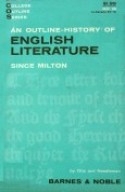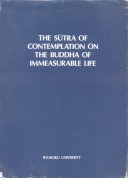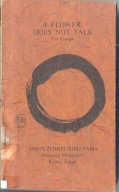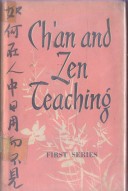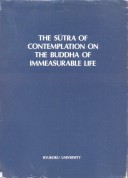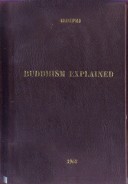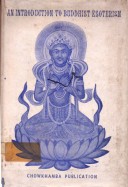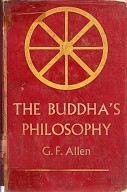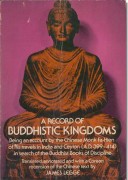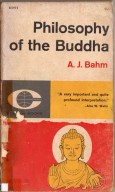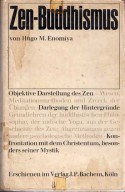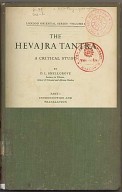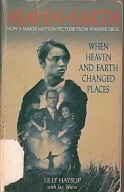Tìm Sách
Sách tiếng Anh-English >> An Outline History of English Literature
Thông tin tra cứu
- Tên sách : An Outline History of English Literature
- Tác giả : Otis & Needleman
- Dịch giả :
- Ngôn ngữ : Anh
- Số trang : 625
- Nhà xuất bản : Barnes & Noble- New York
- Năm xuất bản : 1939
- Phân loại : Sách tiếng Anh-English
- MCB : 12010000006698
- OPAC :
- Tóm tắt :
ABOUT THE AUTHORS
William Bradley Otis is Professor Emeritus of English Literature of the College of the City of New York. He received the B.A. degree from Grinnell College, Iowa, the M.A. degree from Columbia University, and the Ph.D. degree from New York University. Dr. Otis joined the faculty of the College of the City of New York in 1904 and taught there until his retirement in 1948. He is the co-author of another College Outline, An Outline-History of English Literature, Volume I.
Morriss H. Needleman has had many years of teaching experience. He has received the B.A. degree and the M.S. degree in Education. He is the co-author of An Outline-History of English Literature, Volume I and American Literature, both in the College Outline Series.
PREFACE
It is hoped that the Outline-History will not be regarded as merely another summary of English literature. The Outline-History covers the field, we believe, with an eclectic adequacy not attempted by any other manual. In matters of selection and interpretation the authors always have remembered the probable and the practical needs of both the undergraduate college student making his first long excursion into English literature and the majoring or even the graduate college student desiring a comprehensive handbook in compact form.
To make the volume primarily usable it has been found necessary to deviate from the conventional plan of most textbooks. The following are some of the departures:
- The Outline-History brings the treatment of the subject abreast of modern research and criticism. Where opinion contrary to that of the traditional is prevalent, the authors call attention to the fact by notes usually so specific in reference that the teacher or the student can check the statements made and correct any errors of judgment. While indicating where counsels arc divided, an endeavor is made to avoid both antiquated opinions and crotchety modern preferences.
It is a cause for regret that we can not discharge completely our indebtedness to earlier source-studies. Were one able to ferret out the borrowed ideas and to assign to each scholar his particular contribution to the field, such citation of authorities would still be prohibitive because of a number of considerations, chiefly the limitation of space. On the one hand, our general plan of stating matters of common knowledge without recording our indebtedness has meant that in not a few cases outstanding sources of information are mentioned only scantily, or not at all. But it is that very restriction that has made possible a fuller acknowledgment of our obligations in the more specialized instances.
- The Outline-History gives representation to all aspects of the field. For example, the diversified cope of the content provides for the allotment of considerable space to significant minor writers who too frequently have been neglected. A knowledge of these lesser contemporaries is essential to any real understanding of the temper and spirit of an age. In addition, more than cursory attention is accorded the earlier periods of our literature. The conviction that such material should be more generally accessible accounts not only for putting as much emphasis upon Chaucer and Spenser, for example, as upon Shakespeare and Milton, but also for devoting more space to Sir Walter Scott than to Charles Dickens. In its discussion of the fifteenth century in English literature, one usually dealt with fragmentarily or skipped altogether, the Outline-History’s fuller re-statement gives that period its long due; while, on the other hand, in its approach to the Victorian age and our own, the biographical sketches are reduced and the critical comments finally eliminated. If the Outline-History should be considered over-minute in its analysis, it will at least have avoided in the main the mere tabulation of the names of authors, and the tides of their works, and also the general barrenness of scrimped accounts and one-sided interpretations. College students might well be expected to approach the field of English literature from a mature point of view much in that spirit with which for many years they have been expected to approach the field of mathematics or physics or biology or chemistry.
- The Outline-History lends itself to immediate use for further study. Cross-references, footnotes, and other editorial aids have been utilized at strategic points so as to reduce to a minimum the necessity of directing students to other books. The footnotes themselves while stimulating the student’s interest in specific literary problems are a concise, up-to-date bibliography. It should be apparent that the Outline- History has been made, so far as space limitations would permit, a single unit, yet also a point of departure for supplementary readings and explorations.
- The Outline-History indicates foreign as well as native influences upon English literature. Occasionally, it is true, a textbook or two will indicate by a chart that, for example, Machiavelli wrote his Prince and Castiglione his Cortegiano at approximately the time More wrote his Utopia. But the Outline-History makes the point of contact more immediate and more specific: thus, for example, it records the influence of Machiavelli’s Prince upon Elyot’s The Boke named the Governour and upon Spenser’s Veue of the Present State of Ireland, and that of Castiglione’s Il Cortegiano upon Spenser’s Fowre Hymnes and Marlowe’s Hero and Leander. As for Sir Thomas More’s Utopia, the Outline-History indicates the obligation to Amerigo Vespucci’s account of his voyages, to Plato’s Republic, St. Augustine’s De Civitate Dei (upon which More once lectured), and Erasmus’s Institutio Principis Christians.
- The Outline-History has further departures from the usual textbook. A case in point is its attempt at correlation. Thus, in evaluating the most original portion of Anglo-Saxon poetry (Deor, The Wife’s Lament, The Husband’s Message, The Ruin, The Wanderer, and the like), the Outline-History points out that those lyrical or elegiac poems anticipate the dramatic monologue, a form of which the ultimate master is Robert Browning; in outlining Chaucer’s Pardoner’s Tale, the Outline-History states that one of the most recent analogues occurs in Kipling’s Second Jungle Book. When examining William Godwin’s Enquiry concerning the Principles of Political Justice, the Outline-History refers the student to various ideal commonwealths previously encountered, such as Bacon’s New Atlantis, Hobbes’s Leviathan, Bernard de Mandeville’s Fable of the Bees, and also looks forward to Bulwer-Lytton’s The Coming Race, Butler’s Erewhon, Morris’s News from Nowhere, H. G. Wells’s A Modem Utopia, and Aldous Huxley’s Brave New World.
While designed, therefore, primarily for the college undergraduate and the majoring or even the graduate student, it is felt that the Outline-History is useful as well for all who do not have access to adequately equipped libraries or who may find it convenient to have in succinct form a representative discussion of English literature.
The Outline-History doubtless will call for revision. All criticisms will be welcome. Suggestions that may improve the volume’s usefulness will be incorporated, if possible, in succeeding editions. Kindly address the authors in care of Barnes and Noble, Inc., New York City.
M. H. N.— W. B. O.
TABLE OF CONTENTS
Preface
Preliminary. An Approach to the College Survey Course
On the Use of This Handbook
Neo-Classicism
XV The Restoration Period: The Beginnings of Neo-Classicism
XVI The Restoration Period: John Dryden
XVII The Augustan Age: The Triumph of Neo-Classicism
XVIII The Age of Johnson: The Decline of Neo-Classicism
Individualism
XIX The Eighteenth Century: The Novel
XX The Eighteenth Century: The Approach to Romanticism
XXI The Triumph of Romanticism: The Poets
XXII The Triumph of Romanticism: The Prose Writers
Democracy, Science, and Industrialism
XXIII The Victorian Age
XXIV Yesterday and To-Day
Appendices
Supplementary List of Writers
Alphabetical Guide to Miscellaneous Information
Index
 Facebook
Facebook
 Google
Google
 Google+
Google+
